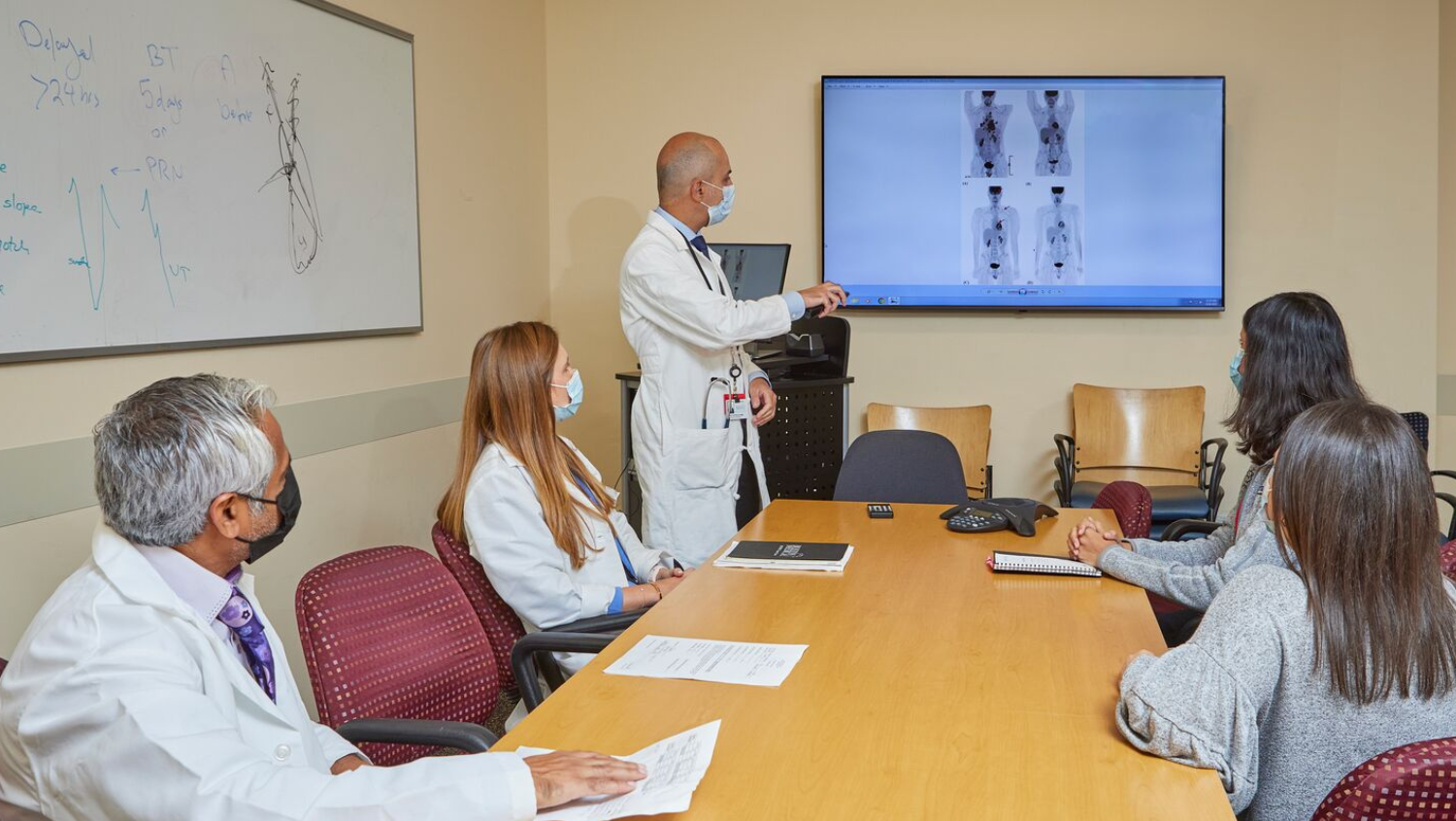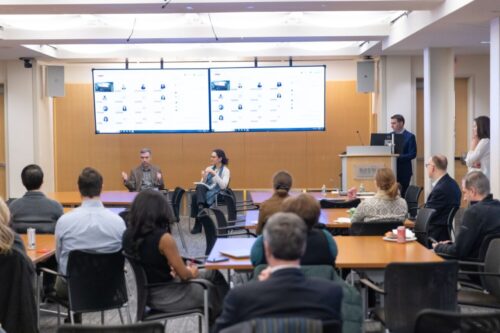BMC Aims to Offer Costly, One-Time Cancer Therapy To All
September 20, 2022

Bruno Debas, Boston Medical Center
CAR T, a personalized cell therapy, has been a game-changer for certain blood cancers, but its high cost has been a huge barrier to equitable access.
At only a handful of clinical sites across the U.S., a one-time therapy is transforming cancer care. CAR T-Cell therapy, or just CAR T, uses genetically engineered versions of a patient’s own immune cells to seek and destroy tough-to-treat blood cancers, including lymphomas, some leukemias, and multiple myeloma. But the personalized cell therapy, uniquely tailored to each patient, involves complex logistics, a tightly controlled manufacturing process, and specially trained clinical care teams. The price for a one-time CAR T-Cell treatment? Between $500,000 and $1 million dollars per patient. While some insurance plans will ultimately pay a portion of the expense, the reimbursement structure for CAR T is still largely in flux. And for patients lacking robust health insurance, the lifesaving treatment has remained largely out of reach.
Fabio Petrocca, MD, a Harvard-trained oncology physician-scientist with more than 15 years of experience in the field, has witnessed the journeys of hundreds of patients treated with CAR T-Cell therapies. Before joining Boston Medical Center (BMC) in 2021 as the director of the Cellular Therapy Program, he spent four years as medical director at bluebird bio, a Cambridge-based biotech company focused on gene and cell therapies, including CAR T. In this role, he was responsible for early clinical trials leading to the first multiple myeloma CAR T-Cell therapy FDA approval last year.
“What we saw in the clinical trials was really unprecedented,” Petrocca says. “Today, CAR T is considered one of the most effective approaches to treat some blood cancers, including multiple myeloma, and ongoing clinical studies are examining whether it could someday be a first- or second-line treatment rather than a last resort.”
But Petrocca says many clinicians have long wondered if CAR T-Cell therapy could ever truly become a new standard of cancer therapy for all patients, or if the costly one-time treatment would continue to be destined for only the most privileged patients that can afford it — or those lucky enough to receive CAR T treatment through clinical trial participation.
The FDA approved the first CAR T-Cell therapy in 2017, and since then, has approved five more.
“Once these therapies started to get approved by the FDA, it became clear that not everybody had the same access to it,” Petrocca says. In most CAR T studies that have led to FDA-approved treatments, the vast majority of clinical trial participants were white. “These elements interested me in the idea of challenging the dogma that this is just a therapy for the wealthy.”
What is CAR T-Cell therapy for cancer?
Part of the reason behind the cost of CAR T-Cell therapy is because of its complex, personalized process.
“CAR T therapy is a technique, rather than a product itself,” Petrocca says. “It works based on the concept of engineering a patient’s own immune cells to be more capable of recognizing and killing tumor cells.”
The technique, essentially, involves using a patient’s own T-cells—a type of white blood cell in the body’s immune system that works to kill “foreign invaders”—to attack and destroy cancer cells. As Petrocca says, “The T-cells are genetically modified to make them more potent, stronger, and ‘smarter.’”
It involves a multi-step process:
- A patient is evaluated to determine whether they meet eligibility requirements to receive CAR T-Cell therapy, including the likelihood that the patient will respond positively to treatment and withstand its potential side effects.
- Patient undergoes leukapheresis, a process through which a patient’s blood is collected from the body and white blood cells are isolated
- The white blood cells are shipped to a specialized manufacturing facility where the patient’s T cells are genetically modified with chimeric antigen receptors (CAR), a cell receptor designed to home in on a highly-specific target—in this case, cancer cells.
- The souped-up T cells, now prepared to be administered as a CAR T therapy, are shipped back to the patient’s clinical care team and reinfused into the patient’s bloodstream.
Patients are usually admitted to the hospital for 7 to 10 days when the CAR T-Cells are reinfused, Petrocca says, to monitor for signs of adverse reactions. The care team then follows up with a patient for 30 days, when they consider the procedure complete.

Fabio Petrocca, MD, director of Boston Medical Center’s Cellular Therapy Program (Dave Markey, Boston Medical Center)
“The distinctive feature of CAR T, compared to current standards for first-line or second-line cancer treatments, is that it’s a one-time treatment,” emphasizes Petrocca. “Once a patient gets home, they aren’t expected to take any other cancer therapies, which is much different from chemotherapy or other targeted therapies.
Because of the logistical complexity, only a few clinical sites can deliver these therapies, and they’re often only available in very large academic medical centers, Petrocca says. It strands patients who cannot afford to travel for their cancer care.
Developing a treatment program to overcome equity barriers to cancer care
BMC hopes to increase access to CAR T-Cell cancer therapy by developing a new program for its patients — who, as a safety-net hospital, are often uninsured or rely on Medicaid.
Petrocca joined BMC with the explicit aim of helping build this new CAR T-Cell cancer therapy program — the hospital’s first — that is accessible and inclusive. The clinical trial program is academic in focus, aimed at advancing the cell therapy field, but it will have a parallel path of expanding who gets access to CAR T therapies, ideally improving clinical and safety data.
“Offering these therapies in more diverse populations of patients will not only address health equity and access but will also boost clinical safety and strengthen drug development,” he says. “We currently don’t really have a lot of data to tell us how best to deliver CAR-T cell therapy in under-represented populations, or to tell us what barriers there might be to making sure that treatment is both safe and effective across a broad socioeconomic context.” Allowing scientists and physicians to study how CAR T-Cell therapy works in a diverse patient population — i.e. whether there are ways to control side effects or develop more effective products for specific population subsets, for example — is the next phase of transitional research that Petrocca is eager to begin.
And, after more than a year of planning and development across many teams, clinicians, and hospital administrators, Petrocca and his collaborators plan to begin administering CAR T-Cell therapy to the first patient later this year. When it comes to accessing this type of specialized cancer treatment, Petrocca made one thing clear about patients who previously may not have been able to afford it, “We don’t plan to reject anyone.”
He goes on to say that “BMC, as an organization, has an excellent clinical trial platform providing a diverse array of patients with access to trials. We’re a well-oiled machine to help its patients overcome barriers.”

Members of Boston Medical Center’s CAR T-Cell therapy program, pictured from left to right: Bhavesh Shah, RPh, BCOP, chief pharmacy officer for Hematology/Oncology; Margaux Dockerty, NP; Fabio Petrocca, MD; Rhadhika Jhaveri, clinical manager; Brittany Fuller, Sr., program manager and clinical quality manager (Dave Markey, Boston Medical Center)
Matthew Kulke, BMC’s chief of hematology/oncology and co-director of the Cancer Center echoes Petrocca’s sentiment about a focus on ensuring a diverse patient base participates in the clinical trials.
“In the cancer world, a lot of cutting-edge therapies start out just being available through clinical trials, making access to clinical trials essential to any center doing top-level cancer care and research,” he says.
Kulke says that it can take more work to facilitate clinical trial participation for patients who, for example, use Medicaid, have language barriers, lack reliable transportation or housing, or face other socio-economic-related challenges, but that’s the focus in this new BMC program.
“There are already phenomenal CAR T treatment programs around the world, but what sets BMC apart is the patients we serve,” Kulke says. “We want to be the model for how to provide equitable cancer care — we want to be the cancer center of the future.”
CAR T paves the way for new innovations in cell therapy
Petrocca’s background as a physician-scientist allows him a unique perspective in both the lab and patient interactions. He can use patient experience to aid in the development of new therapies, particularly in making these new therapies accessible to a wider pool of patients who need them.
According to Petrocca, expanding CAR T access and research is just the beginning of the innovations other types of cell therapy can offer to cancer patients, but it will require seamless cross-sector collaboration between academic institutions, the biotech industry, and the pharmaceutical industry, for which Boston provides an ideal ecosystem. It is through this cross-sector collaboration that Petrocca sees space for other types of life-changing cell therapies to emerge.
“Cell therapy is something many think of as the future of oncology,” Petrocca says, “And there’s no reason why it should not evolve at a place like BMC.”
For more information on the CAR T-Cell cancer therapy program, visit its page on BMC.org.


